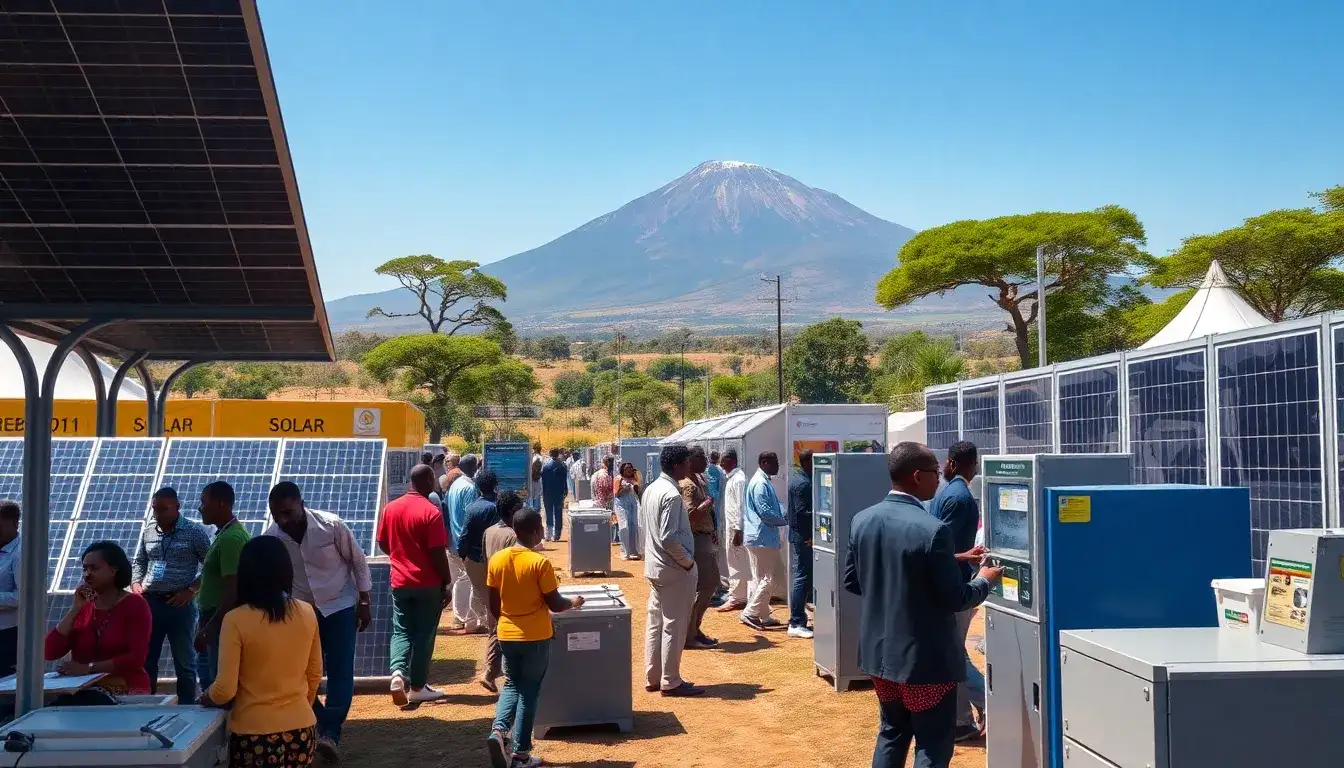
The 2025 Tanzania Solar Energy Storage Exhibition: Solar Africa 2025
Event: The 9th Solar Africa 2025
Date: October 8-10, 2025
Location: Dar es Salaam, Tanzania
Frequency: Annually
Organizer: Expogroup
Co-organizer: Dongfang Futai (Beijing) International Exhibition Co., Ltd.
Exhibition Overview
The Solar Africa 2025 exhibition will serve as a pivotal platform for exploring the energy transformation in East Africa, particularly against the backdrop of the global energy transition. The application of photovoltaic and storage technologies is becoming increasingly vital in Tanzania’s energy development. Blessed with abundant sunlight, Tanzania has significant potential for photovoltaic generation, while the growing demand for storage technology is driving profound changes in the energy market.
This exhibition will offer companies, investors, and policymakers from around the world the opportunity to gain comprehensive insights into the dynamics of the Tanzanian market, enabling them to seize opportunities in this emerging sector. With the Tanzanian government actively promoting policies in the energy sector, especially through investments in renewable energy, the integration of photovoltaic batteries and storage technologies is accelerating.
Exhibition Highlights
Solar Africa 2025 will not only showcase the latest photovoltaic generation and storage equipment but will also focus on how these technologies can be combined more efficiently and intelligently to enhance energy utilization and system stability. Smart grid and distributed energy management solutions will play a significant role in helping Tanzania and neighboring countries achieve better distribution of energy resources, facilitating regional energy sharing and optimization.
The exhibition will also promote international cooperation and investment opportunities. As Tanzania takes on an increasingly important role in the global green energy landscape, both domestic and foreign energy companies are ramping up investments in this market. The event provides an excellent platform for businesses to showcase their latest technologies and products, seek potential partners, and discuss ways to expand their operations in Tanzania and the East African market.
Market Insights
Tanzania’s Photovoltaic Battery Storage Market Analysis
Tanzania’s energy demand is steadily rising, particularly in remote areas where electricity supply issues are becoming more acute. With limited grid coverage, traditional energy sources struggle to meet widespread electricity needs, making photovoltaic battery storage systems an effective solution. Tanzania’s rich solar resources create vast potential for photovoltaic generation, and the introduction of storage technology further enhances energy efficiency, especially in addressing power instability and nighttime consumption challenges.
The country’s renewable energy policies are driving rapid development in the photovoltaic battery storage market. The government encourages enterprises and investors to enter this field through tax incentives and financial support. The influx of international technology and capital is continuously upgrading storage system technologies, reducing costs, and expanding applications from urban areas to broader rural contexts. This rapid market growth suggests that Tanzania will accelerate its transition to green energy in the coming years.
Key Trends and Developments
The Tanzanian photovoltaic battery storage market is experiencing rapid development, driven by increasing global demand for renewable energy. This trend is supported by government policies and international funding, which gradually reduce the costs of photovoltaic projects, making them accessible to more households and businesses. As energy prices fluctuate and reliance on traditional fossil fuels decreases, the economic viability and sustainability of photovoltaic storage become increasingly evident, attracting more private and foreign investments.
Moreover, the shortage of electricity in Tanzania is prompting a rising demand for small distributed photovoltaic battery systems, particularly in remote and rural areas where grid development is lagging. These systems not only provide stable electricity supply but also significantly reduce dependence on fossil fuel generation, thus mitigating environmental pollution. Consequently, more local governments and communities are advocating for photovoltaic battery systems to provide residents with more flexible and independent energy options.
Exhibits and Technologies
Exhibit Categories
- Photovoltaic Storage: Smart grids, photovoltaic storage power supplies, grid-connected inverters, storage converters, UPS systems, energy monitoring systems, off-grid home storage systems, lithium UPS systems, and solar water supply systems.
- Battery Storage Technologies: Lithium-ion batteries, lead-acid batteries, nickel-cadmium/nickel-hydride batteries, redox flow batteries, fuel cells, and battery recycling technologies.
- Energy Storage Systems: Residential, commercial, and utility-scale storage applications, as well as mobile storage solutions for electric vehicles.
- Storage System Components and Equipment: Battery management systems, charging technologies, and power electronics for storage systems.
- Manufacturing Equipment, Materials, and Components: Battery manufacturing, module manufacturing, and assembly systems.
- Bioenergy: CDM infrastructure, biogas, and agricultural solutions.
- Wind and Hydropower: Power equipment, turbines, and measurement/control devices.
- Waste Treatment Technologies: Battery industry waste treatment equipment and recycling technologies.
Future Outlook
The future of Tanzania’s photovoltaic battery storage market looks promising, with continuous growth expected as market demand increases. More innovative technologies and business models will emerge, further positioning Tanzania as a benchmark for renewable energy in Africa, providing valuable experiences and solutions for other countries.
With the government’s ongoing support for renewable energy, the photovoltaic battery storage industry is set to thrive, laying a solid foundation for energy diversification and sustainability in the country. Increased investments and improved infrastructure will enable Tanzania to become a regional energy hub in East Africa, enhancing its competitiveness in the global renewable energy sector.







